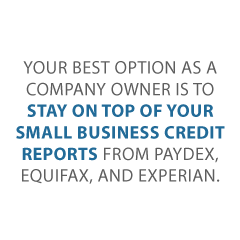Learn How to Check Your Business Credit Like the Top Small Business Owners Do!
Do you know how to check your business credit scores and avoid costly errors?
Your best option as a company owner is to stay on top of your business credit report from PAYDEX, Equifax, and Experian.
There are three big credit report agencies for businesses and you absolutely should assess all three of them regularly. This is because they use slightly different yardsticks. So moving the needle for one can move the needle for both of the others. Although it’s maybe not as much.
These agencies all gather data from the Small Business Financial Exchange, as well.
Do not let your business credit scores slide, as you must catch any inaccuracies as soon as you can, as well as locate anything which is dragging your scores downward then afterwards take remedial action.
You can start checking business credit and stay right on top of all three scores by following a few uncomplicated steps.
How to Check Your Business Credit at D&B (PAYDEX)
Dun & Bradstreet’s PAYDEX score of your small business can end up as one of the primary reasons why your business acquires credit in any manner.
D & B provides Credit Signal, which is a means to monitor your credit score by having the reports come immediately to you, for a cost.
You may find the cost is well worth it to avoid the worries that can come from letting this score slip, and to not have to create and manage the schedules and reminders you might need to stay on top of if you don’t use it.
Alternatives to Credit Signal
Don’t want to use Credit Signal? Not to worry, as you can receive your PAYDEX report by way of D & B and, if needed, you can get in touch with their Customer Service department. So this department exists as a section of Dun & Bradstreet itself.
Additionally, in order to review your PAYDEX report, check out what D & B provides. It is a sample report and even some higher level suggestions of how to interpret it.
Your Business’s PAYDEX Score
Dun & Bradstreet’s PAYDEX score runs from 0 to 100. A PAYDEX score has a basis in payment information which is either reported to the business credit bureau or is reported to data-gathering businesses partnering with the agency.
D & B uses this information, alongside a credit score and financial stress score, so as to advise how much credit a lender ought to extend to your company.
Getting a PAYDEX Score
In order to get a PAYDEX score, you must file for a DUNS number by using Dun & Bradstreet’s web site. The number is free of charge. Plus the CRA has to have reports of your payments with four or more vendors.
Your business’s PAYDEX score reveals if your payments are typically made promptly or ahead of schedule. As you might expect, a higher number on your credit report is better.
PAYDEX Score Details
The scores work out as follows:
- 80 – 100: A low risk of late payments
- 50 – 79: A medium risk of late payments
- 0 – 49: A high risk of late payments
Business Credit Score
Your business credit score runs from 1 to 5. 1 is the very best score. This matches your business with other businesses with comparable payment histories. The figure shows how frequently those companies tend to pay punctually.
This data can help lenders to comprehend your business’s standing. But it does not genuinely show all of the payment records from your business.
Financial Stress Score
The financial stress score also runs from 1 to 5. This score matches your company with other small businesses sharing similar financial and business attributes. These similarities are in areas such as size or amount of time in business.
This score demonstrates how frequently those companies tend to pay on time. As before, 1 is the best score. This rating is a broader look at the business landscape, versus an analysis of your company’s real business credit history.
A great PAYDEX score for your business is 80 – 100.
How to Check Your Business Credit Score at Equifax
Equifax, one of the major credit report bureaus, supplies a credit monitoring service which is easier as it enables reports to go straight to you. If you don’t want to pay for continual reports, you can as an alternative order your company’s Equifax report.
In addition, if you need to challenge your business’s Equifax report, you can do so by following the directions on their website. You can learn to go over your Equifax report by looking into a sample of their reports.
As a result of the 2017 Equifax data breach, there are even more reasons to peruse your company and consumer credit report. And be vigilant about any issues you detect.
Your Small Business’s Equifax Score
Equifax displays three distinct business determinations on its business credit report. These are the Equifax payment index, your business credit risk score, and its failure score.
Equifax Payment Index
Similar to the PAYDEX score, Equifax’s payment index, which is gauged on a scale of 100, shows how many of your company’s payments were made on time. These include both records from creditors and vendors.
But it’s not designed to predict future activity, which is what the other two scores are for.
Equifax Credit Risk Score
Equifax’s credit risk score checks how likely it is your company will become severely delinquent on payments. Scores range from 101 to 992, and they evaluate:
- Available credit limit on revolving credit accounts, e. g. A credit card
- Your business size
- Proof of any non-financial transactions (e. g. merchant invoices) which are unpaid or were charged off for two or more billing cycles
- Amount of time since the opening of the oldest financial account
Equifax Business Failure Score
Lastly, Equifax’s failure score takes a look at the risk of your small business shutting down. It runs from 1,000 to 1,600, reviewing these factors:
- Total balance to total current credit limit average utilization in the prior three months
- The length of time since the opening of the oldest financial account
- Your business’s worst payment status on all trades in the most recent 24 months.
- Evidence of any non-financial transactions (e. g. vendor invoices) which are delinquent or have been charged off for two or more billing cycles.
Equifax Score Analysis
For the credit risk and the failure scores, a rating of 0 means bankruptcy.
A good Equifax small business score for your company is as follows:
- Payment Index 0 – 10
- Credit Risk score 892 – 992
- Business Failure score 1400 – 1600
How to Check Your Business Credit at Experian
Experian, another big credit reporting agency, also offers a method for getting reports sent to you for a charge. Therefore you can monitor your Experian small business credit score and the setup is simple.
On the other hand, if you prefer to not get continuing reports (and pay for them), no problem! Then you can order a single Experian report for your business on their website.
Likewise, if there are any problems or issues, you can contest any mistakes on your business’s Experian report. Just follow the instructions on their website. Learn about examining your Experian report by checking a sample Experian business credit report.
Your Business’s Experian Business Credit Score and Company Credit Check
Experian’s Credit Score report includes things like a business credit score as well as additional data, including account histories, payment trends, and public records. Experian company credit scores run the gamut from 1 to 100.
In contrast to Dun & Bradstreet’s PAYDEX score and Equifax’s payment index, Experian takes into consideration numerous factors, and not simply payment histories.
Experian Scoring Factors
The factors which go into the calculation include:
- Lines of credit your business has an application for in the last nine months
- New lines of credit you’ve begun in the prior six months
- Your company’s years in business
- Payment history in the last twelve months
More Experian Scoring Factors
- Lines of credit in use in the most recent six months
- Collections amounts in the prior seven years
- Percent of available credit in use
- Amount of payments one – 30 days late, or 31 days or more late
- Amount of non-net 30 lines of credit (that means the payment is due in fewer or greater than 30 days).
Experian business also gets some of its scoring data from the personal credit history of a small business owner. Your personal credit report will include factors such as credit utilization, credit inquiries, and the age of your oldest credit card.
With Experian, a good business credit score will, in part, come from a good credit score on the personal side.
In most cases, even companies which use credit sensibly will get a medium-low risk rating. As you might expect, older businesses will have an easier time attaining a low-risk rating.
A decent Experian score for your business is 76 – 100.
Know How to Check Your Business Credit before Your Competition Does it For You
So sometimes, it pays to hand over a few dollars. And ensure that you get your business credit report on a regular basis.
It’s a lot less complicated than having to always remember to do this and you’ll probably take a look at these reports more carefully, as they come at a price tag.
So keep on track and use the resources these credit report firms offer. And make your life easier as you check your business credit scores. If you’re wondering how to check my business credit score, the answer may very well be: let someone else do it for you.
Others will check your business credit score, like the Small Business Administration and lenders when you go for a small business loan or another form of financing.
Keep your numbers in line and good things will happen. Discover this new way to check your business credit scores and reports.
FAQs
Are There Any Free Options for Checking a Business Credit Score?
Unlike with your personal credit score, there are no annual free options. But do keep in mind that financing providers will check your personal credit accounts so you should check them as well.
Improving your personal credit score is one of the ways to build business credit so you should make sure your credit history and reports are correct.
When you work with Credit Suite to improve your credit scores so you can get a business loan or another form of financing, we include your business credit scores as a part of your package.
What Information Will You Need to Check Your Score?
You will need to have business identifying information in order to check your credit scores. This means, in the case of Dun & Bradstreet, your DUNS number. And for Experian, it’s your BIN number.
If you signed up directly with the bureaus, then check your account and be sure you spell any request or search exactly the way you signed up. For example, if your business is Sanford and Son, and you signed up that way, then you should not be looking under Sanford & Son.
Yes, the bureaus are that strict when it comes to matching and searches.
How Much Does it Cost to Check Business Credit?
Credit scores for business are not free. And, much like with anything else, inflation has hit this area.
Credit card companies, cash flow financing providers, and lenders tend to buy these in bulk, as they are checking far more than just one business credit card application at a time. But they would have to get permission to check your personal credit score.
But you will likely be checking your credit scores to be sure that they haven’t gone down. Also, you may be checking your credit scores to determine if a particular payment has been reported.
When you work with Credit Suite, we include your credit scores and even help you interpret them.

